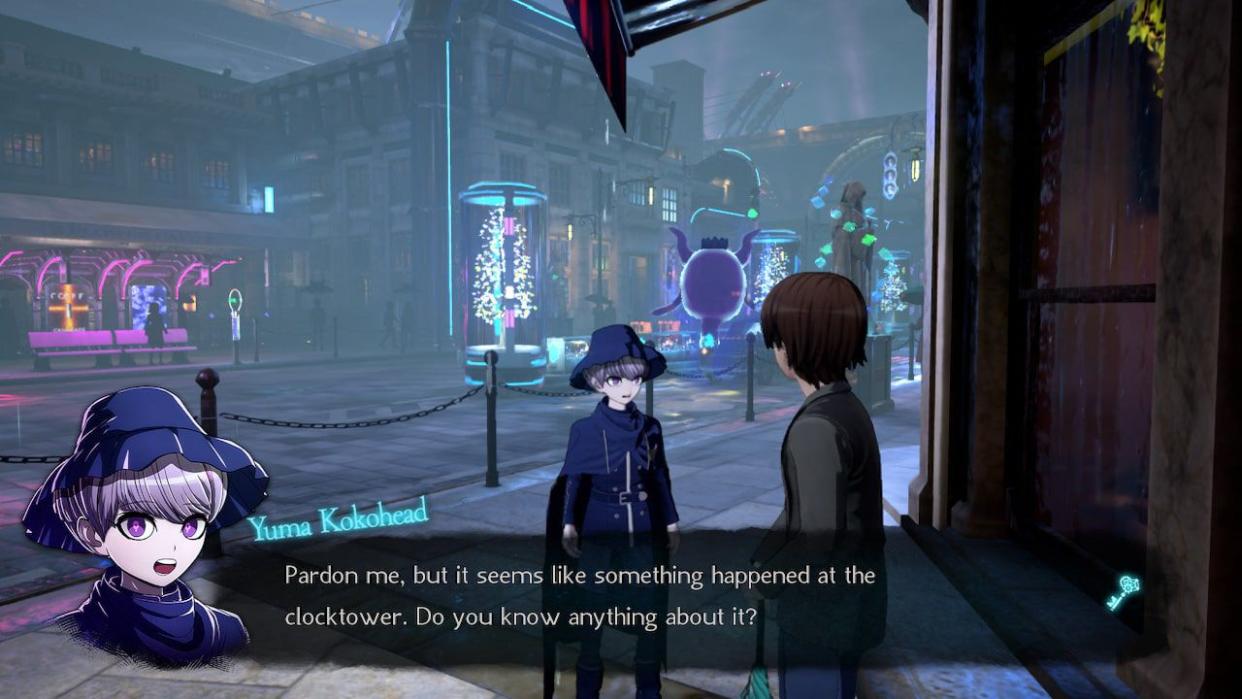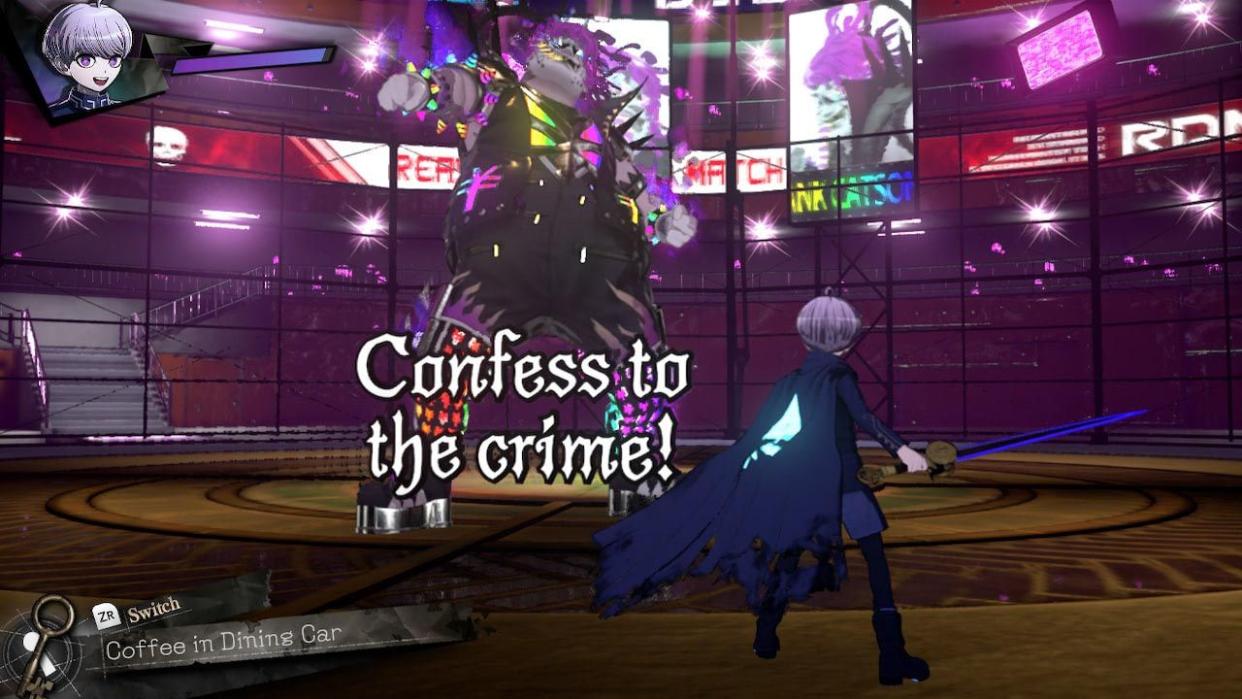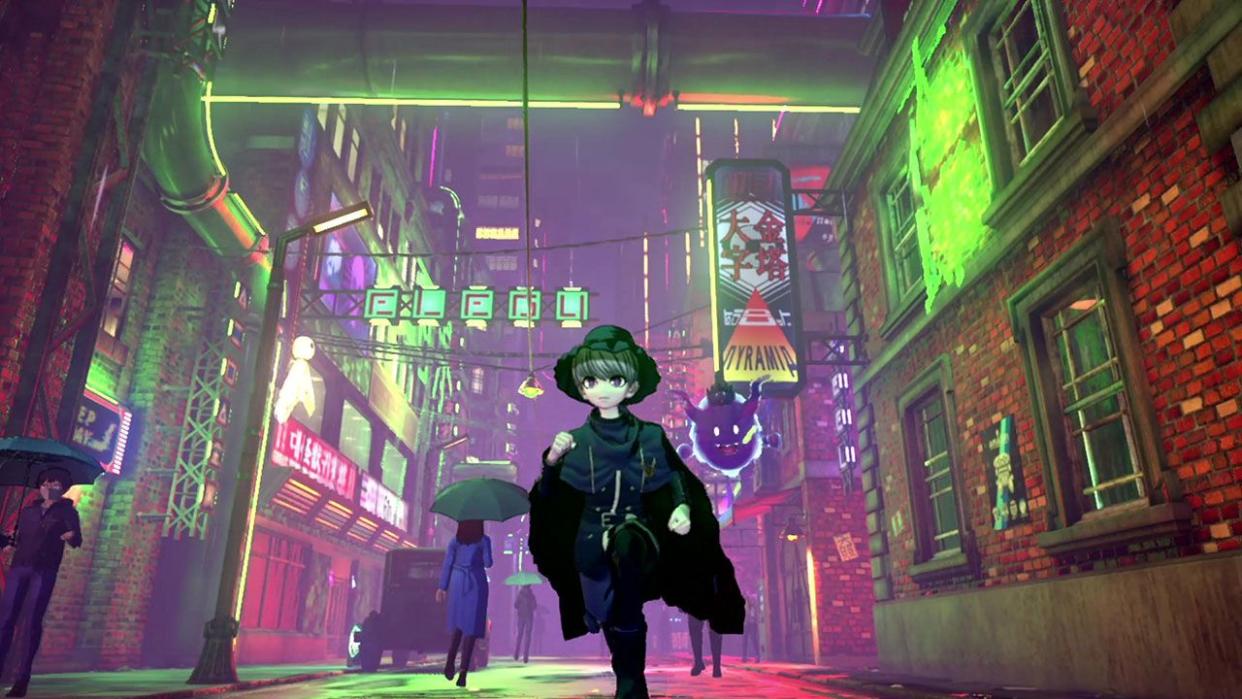Rain Code doesn't quite live up to the Danganronpa games

Master Detective Archives: Rain Code, from many of the team behind the Danganronpa games, begins with a thrilling murder case. Amnesiac protagonist Yuma, who learns he's a member of the World Detective Organisation, finds himself in the most precarious of situations during a train ride and must urgently solve a whodunit.
Across the whole game, there are six cases in total – but out of the first four, this introduction chapter is the only one that stands out. It's bold and unpredictable, there is narrative drive behind the case, and the journey to the conclusion is mostly satisfying.
Yuma ends up arriving at Kanai Ward, a city that is plagued by never-ending rain and is isolated from the rest of the outside world. The Amaterasu Corporation calls the shots here, and Yuma learns that he and the other Master Detectives have been gathered at Kanai Ward to investigate and get to the bottom of the secrets and mysteries behind the city.

Related: AEW: Fight Forever review
Yuma edges closer to the truth with every murder solved, and each case is split into two halves. The first is the investigation stage, where Yuma interacts with the crime scene and other places of interest, speaks with potential suspects, and gathers as many clues as possible.
After all of that, Yuma must then piece together the identity of the culprit, how the murder was done, and the motive, and this segment involves Yuma's sidekick Shinigami.
Shinigami is no ordinary sidekick. She's a death god whom Yuma is stuck with due to a pact that they made (which is also the cause of Yuma's amnesia), but she comes with a special power of her own – the ability to create a Mystery Labyrinth, a surreal-looking mind palace of sorts that Yuma must venture through, using logic to answer questions about the case through minigames in order to solve the case.
At the end of a labyrinth, the killer is exposed and executed. It's not unlike the Danganronpa games in this regard. But overall, these labyrinths are a disappointment.

A reason why the trials in Danganronpa and Phoenix Wright work is the storytelling they provide while you're trying to figure out the truth. Stakes are felt, and being able to interact with other characters involved – suspects, Monokuma, prosecutors, and so on – provides a greater dynamic feeling as the twists slowly reveal themselves.
By contrast, in Rain Code, time is frozen when you enter a Mystery Labyrinth, and any characters Yuma comes across inside are just manifestations of them rather than the real versions. Yuma spends most of the time in the labyrinth thinking out loud.
The labyrinths end up feeling like a waste of time if you've already cracked the case yourself. Being several steps ahead of Yuma is tedious, as you're forced to go through the motions with the minigames while watching Yuma get fooled by red herrings without the benefit of any real narrative value.
After three consecutive underwhelming cases, the game finally realises its potential with the last two chapters.

The penultimate case manages to counter the flaws of the labyrinth structure by raising the emotional stakes and ensuring that the murder itself isn't as straightforward to solve. It's the first time since the opening chapter where the game succeeds in providing drive behind Yuma's journey in the labyrinth.
It's followed by the final case, the culmination of Yuma's journey in Kanai Ward, and if there's one thing that Rain Code surpasses Danganronpa in, it's the world-building and utilising that to service its story.
Throughout the game, there is a large emphasis on the city itself, with the player able to freely explore the many districts and areas in 3D as they go about their investigation.
In between cases, Yuma can also complete a number of side-quests from various residents across Kanai Ward. These usually amount to nothing more than travelling from point A to B to C, and require very little deduction. But while these quests – from tracking down a thief to helping an activist disillusioned with the city gather information – aren't particularly noteworthy and can individually come across as busywork, they do contribute in giving character to the city.

Related: Oxenfree 2: Lost Signals review
It's a deliberate decision that serves a larger purpose, in asking the player to immerse themselves in the rain-soaked Kanai Ward. And it's a decision that pays off by the end.
It's obvious that you're more likely to become invested in a murder case when you have connected with those at the centre of it – such as the victim and suspects – and it's a significant factor behind Danganronpa's success, with that franchise boasting numerous fan-favourite characters and memorable cases.
A similar logic applies here. By becoming a part of Kanai Ward, when the secrets shrouding the city are finally exposed in the final chapter, the revelations manage to hit harder as a result.
The endgame even manages to somewhat redeem Shinigami, who up until that point is one of the game's more obnoxious characters alongside an irritatingly-written male detective who fills the Casanova trope. While comparisons can be made between Shinigami and Monokuma, the former is brash and overbearing for large parts of the story (and not in a fun way), including when she insults the other female characters – repeatedly calling one a "skank" and another a "flat-chested uggo".

The rest of the cast are solid, though. Among them, Yuma's relationships with local agency head Yakou and informant Kurumi are engaging, while there is also Halara, who reads as non-binary and quickly emerges as perhaps the most competent detective of the lot.
The final two cases are undoubtedly a huge cut above the others that take place in Kanai Ward, and it's a shame that the game takes so long before hitting its highs.
But stick through to the end, and Rain Code eventually delivers a satisfyingly twisty adventure in spite of its shortcomings – helping to somewhat fill that Danganronpa void.

Master Detective Archives: Rain Code is out now on Nintendo Switch.
You Might Also Like
